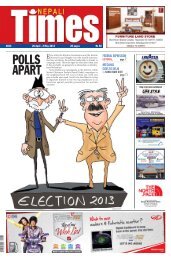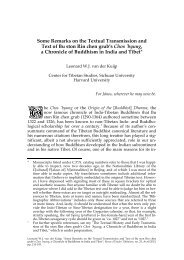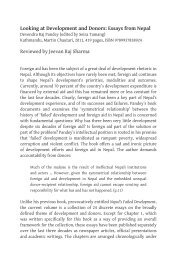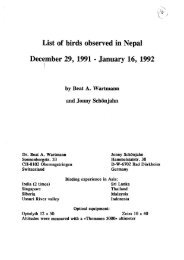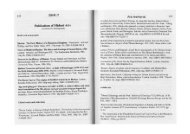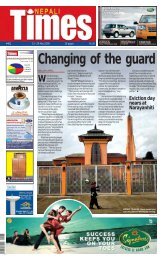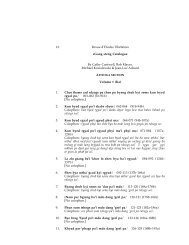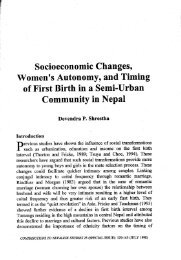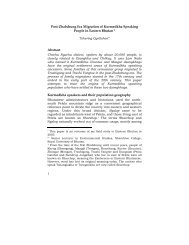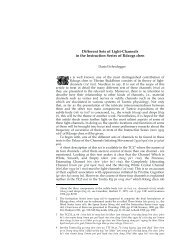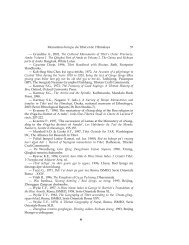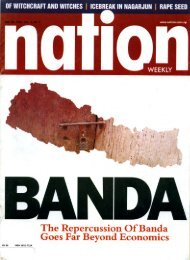Nepali Times - Digital Himalaya
Nepali Times - Digital Himalaya
Nepali Times - Digital Himalaya
Create successful ePaper yourself
Turn your PDF publications into a flip-book with our unique Google optimized e-Paper software.
6 FROM THE NEPALI PRESS 3 - 9 NOVEMBER 2000 NEPALI TIMES<br />
Nation in favour of Maoist proposal<br />
Rabindra Shrestha in Kantipur, 19 October<br />
The politburo of the Communist Party of<br />
Nepal (Maoist) has called for a dialogue<br />
saying that only dialogue can resolve the<br />
grave problems faced by the people.<br />
Comrade Prachanda had called for a<br />
dialogue immediately after the successful<br />
attack in Dolpo. As a response, the<br />
government tried to build a consensus on<br />
how to deal with the “People’s War”<br />
through a forum convened by the Speaker<br />
of the House of Representatives. To keep<br />
his corrupt government in power and to<br />
suppress the just protest of the people, the<br />
prime minister is even prepared to<br />
mobilise the army. To some extent this<br />
has failed to materialise. All parties (except<br />
the Girija faction) are in favour of dialogue<br />
as was made public at the all-party<br />
meeting convened by Sher Bahadur<br />
Deuba. All parties and people have<br />
strongly opposed the stand taken by the<br />
PM which shows that the PM has lost the<br />
moral authority to continue in power. The<br />
government is clearly in a minority. The<br />
government which had a policy of<br />
excluding and finishing off the Maoists is<br />
now isolated. In spite of this, the<br />
government, true to its reactionary<br />
character, is now preparing for civil war.<br />
The government thinks it will be able to<br />
solve all domestic and international<br />
problems of the country by mobilising the<br />
Profits all the way for NOC<br />
○ ○ ○ ○ ○ ○ ○ ○ ○ ○ ○ ○ ○<br />
○ ○ ○ ○ ○ ○ ○<br />
Nepal Samacharpatra, 1 November<br />
The Energy Research Centre of the<br />
Institute of Engineering organised a<br />
discussion on the implications of the recent<br />
changes in fuel prices in which experts<br />
warned of severe consequences on the<br />
economy.<br />
Director of Nepal Lube Oil Ltd, Amrit<br />
Nakarmi presented a 20-year data series on<br />
prices of petroleum products in Nepal,<br />
arguing that the Nepal Oil Corporation<br />
(NOC) stood to earn a profit of Rs 520<br />
million a year even if it sold kerosene at Rs<br />
19 per litre (instead of the present rate of Rs<br />
26). Nakarmi, a former general manager of<br />
the NOC, argued that petroleum prices<br />
were raised due to NOC’s inability to take<br />
precautionary measures because<br />
international prices were already headed<br />
upwards in late February 1999. “The<br />
present crisis could have been prevented if<br />
the NOC had carefully studied the market<br />
and prepared long-term plans for domestic<br />
consumers accordingly,” he says.<br />
Nepal’s annual per capita consumption<br />
of petroleum products is 35 kg, compared<br />
to the US’s 3,170 kg, Canada’s 2,835 kg,<br />
Japan’s 2185 kg and India’s 82 kg. In Nepal<br />
QUOTE OF THE WEEK<br />
army and starting a civil war. The fascist<br />
group in the Congress was sidelined at the<br />
all-party meeting.<br />
The government media which is run on<br />
the hard earned money of the people and<br />
some private papers close to the fascist<br />
government have been spreading the<br />
rumour that it was only after the<br />
government decided to mobilise the army<br />
that the Maoists agreed to a dialogue. They<br />
said that the Maoists were frightened by the<br />
mobilisation of the army, which actually is a<br />
very base remark and one that amounts to<br />
lying to the people. The truth is that<br />
Comrade Prachanda had called for dialogue<br />
immediately after the Dolpo incident. That<br />
was when the Girija camp began<br />
expounding its “new principle” that the<br />
Maoists were scared. That it was the<br />
government that was scared and implored<br />
for help from the palace and the army is<br />
something that cannot be hidden if one<br />
wanted to.<br />
What is the reason for the Maoists to<br />
propose talks? The answer is realisation of<br />
their responsibility towards the people.<br />
What do the Maoists think about war?<br />
Responding to a question of an American<br />
reporter, Mao had once stated, “As far as<br />
we are concerned, we do not want to fight<br />
for a single day, but if circumstances force<br />
us, we will fight till the decisive hour.”<br />
the sale of petroleum product has been<br />
increasing by 12.41 percent each year. But<br />
most of Nepal’s energy is obtained from<br />
traditional sources—88 percent from<br />
firewood, nine percent from petroleum<br />
products, two percent from coal, and one<br />
percent from hydroelectricity. Nakarmi<br />
added that only the mechanisms of a free<br />
market could correct the inefficiencies of<br />
the NOC, and lead to more realistic prices.<br />
At the same meeting, Deputy Director<br />
of NOC Rudra Bahadur Khadka clarified<br />
that the corporation cannot always fix prices<br />
based on the market situation only, adding<br />
that the government decision to subsidise<br />
five litres of kerosene per family per month<br />
would lead to annual losses to the tune of<br />
Rs 2.4 billion.<br />
‘Koirala’s leadership has<br />
been tested already’<br />
○ ○ ○ ○ ○ ○ ○ ○ ○ ○ ○ ○ ○ ○ ○ ○ ○ ○ ○<br />
○<br />
Budhabar, 25 October<br />
(Excerpts from an interview with Chiranjibi<br />
Wagle, <strong>Nepali</strong> Congress dissident leader.)<br />
Q: You contested against Koirala for party<br />
leadership at the 9th party convention. How are<br />
you preparing for the forthcoming 10th<br />
convention?<br />
A: I believe that the leadership should be<br />
The CPN (Maoist) has from the<br />
beginning advocated peaceful means to<br />
resolve the problems of the country and<br />
people. Again after the Dolpo incident,<br />
Comrade Prachanda, in the belief that<br />
logical thinking and rationality would<br />
prevail in the government, had proposed<br />
talks. To consider this offer as a sign of<br />
weakness of the Maoists is nothing new to<br />
some sections of the PM’s supporters.<br />
Whether the country heads into civil war or<br />
not will depend on whether the government<br />
takes or rejects the advice of such idiots.<br />
If to suppress the people’s voice the<br />
PM uses the army, people with even the<br />
least humane and religious sentiments will<br />
take notice. If the army is mobilised, the<br />
civil war that will follow will result in a<br />
thousands repeats of the Khara incident<br />
(where the police is said to have torched an<br />
entire village). Everyone knows this. But is<br />
it justifiable to sacrifice thousands of human<br />
live to save the necks of his corrupt<br />
colleagues and his ‘corruptocracy’ (not<br />
democracy)? The Maoists have called for<br />
dialogue to avoid such severe consequences.<br />
Is it justifiable to call this a sign of<br />
weakness or fear? The government may see<br />
benefits that can accrue from a civil war.<br />
They know that maximum kickbacks can<br />
be got on weapons purchases. It will also be<br />
easier for them to suppress the revolt in the<br />
handed over to the new generation. It was<br />
in this belief that I contested for the post of<br />
party president at the 9th convention. I<br />
believe that Koirala’s leadership has already<br />
been tested and another five years have<br />
passed. Now we are preparing for the village<br />
convention. After the village and town<br />
conventions, the regional conventions will<br />
be held, which will be followed by the<br />
district conventions. Only then will the<br />
national convention be held. To talk about<br />
leadership issues at that time would be<br />
ideal.<br />
Q: Isn’t your demand of handing power to the<br />
new generation going to create problems for you<br />
in the cabinet reshuffle that is going to take<br />
place soon?<br />
A: I am not going to be in any difficulty. I<br />
don’t know if it is going to be a problem for<br />
others. In the working committee meeting<br />
held last Sunday, an agreement was reached<br />
among us. Now the implementation of that<br />
agreement is the most important issue.<br />
There should not have been such a big hue<br />
and cry over the names of the party<br />
workers. This sort of problem never occurs<br />
in any other party, only in the <strong>Nepali</strong><br />
Congress.<br />
Q: What is the next issue after this? Earlier the<br />
When the army had been mobilised to disarm the Khampas (in 1972), the entire area had been declared a military zone, and all<br />
security agencies were under the army. The administration also worked with the army. (That is why despite)...reports of army<br />
mobilisation in some districts today, we cannot in truth call it mobilisation of the army.<br />
—Sachit Sumsher Rana, former Commander in Chief of the Royal Nepal Army, in Jana Astha, 25 October.<br />
Maoist Problem Solving...High-Level...Recommendation Committee<br />
Himal Khabarpatrika, 1-15 November<br />
Congress and to control the opposition by<br />
declaring army rule. Even foreign powers<br />
may be backing the fascist government to<br />
run down the Maoists. But the fact is that<br />
dialogue seems to be the best way through<br />
which the country’s problem can be<br />
resolved and a civil war can be averted.<br />
In such a situation can a civil war be<br />
avoided? Before fighting the fascist powers<br />
in his country in 1945, Mao had said, “If all<br />
people become united and increase their<br />
strength, a civil war can be avoided.” For<br />
these very reasons, the Maoists have called<br />
for the formation of a Comprehensive<br />
United Front without any preconditions to<br />
fight the fascist government and were<br />
getting positive feedback on that call.<br />
The government itself is helping to form<br />
this Front to a great extent. By increasing<br />
the price of petroleum products recently,<br />
the government has made enemies of the<br />
people and the opposition and encouraged<br />
them to revolt. By destroying the agreement<br />
reached between the government and the<br />
nine left parties, the RPP, the UML and the<br />
NSP, the government has pushed all these<br />
parties toward the Front. Some MPs close<br />
to the PM have labelled Deuba a Maoist, so<br />
people from the Bhattarai-Deuba camp will<br />
also be inclined toward the coalition.<br />
Chiang Kai-Shek had once said that<br />
Mao should be thanked for helping the<br />
Chinese villages to develop. Mao had said<br />
that Chiang Kai-Shek should actually be<br />
thanked for oppressing the communists in<br />
the city and driving them to the villages and<br />
issue of free and fair elections at the convention<br />
had cropped up and you had asked for a<br />
separate system.<br />
A: For this an election committee has been<br />
formed. The meeting of the working<br />
committee discussed this too. A fivemember<br />
election committee has been<br />
formed, with two representatives from our<br />
side and two from the opposing side. The<br />
5th person is Mukunda Regmi, who is<br />
neutral and is the chief of the party election<br />
commission. That the commission will take<br />
care of all issues regarding the election has<br />
been agreed to at the meeting. But the issue<br />
of party members is likely to crop up and<br />
the issue of representatives and observers is<br />
also important. For this, my friends and I<br />
had asked that these be resolved as per the<br />
regulations of the party. Representatives and<br />
observers will be sent only after a consensus<br />
has been reached. After this, the possibility<br />
of having fair elections is very high.<br />
Q: You were a candidate for party president<br />
earlier. Were there irregularities then?<br />
Otherwise why are you raising the question of<br />
free and fair elections?<br />
A: Everyone learns from history. I don’t<br />
want to get into how the elections were<br />
held earlier. The present central committee<br />
has dissolved 16 or 17 district committees.<br />
Many of the district committee presidents<br />
had voted for me at the 9th convention. All<br />
of them have been removed. This shows<br />
indirectly helping to establish base areas<br />
in the villages. In the same way, the PM<br />
has pushed them closer to such a Front.<br />
The CPN (Maoist) has said that the<br />
present government cannot be trusted.<br />
Why is this so? The PM has violated all<br />
agreements he has made with all political<br />
parties. He has broke agreements reached<br />
with the Bhattarai-Deuba camp. He has<br />
not been keeping his word. Therefore he<br />
has lost the trust of everyone.<br />
Another reason is that the<br />
government alone cannot resolve the<br />
problems faced by the people and the<br />
country. For all problems to be solved,<br />
the Maoists believe, dialogue must be<br />
held with all parties. All political parties<br />
have started taking positive steps towards<br />
this.<br />
Even in such circumstances the<br />
government has not taken any steps to<br />
build an environment conducive to talks.<br />
Even Deuba said that the whereabouts of<br />
Dinesh Sharma and other Maoists in<br />
custody should be made public, but no<br />
action has been taken on this front.<br />
While a dialogue between Deuba and<br />
Maoists has been taken positively by all<br />
people, a certain section of the fascist<br />
Congress still thinks it is a conspiracy.<br />
This is all because of their lust for power.<br />
(The author, a central committee member of<br />
the CPN-Maoist, held talks with Deputy<br />
Prime Minister Ram Chandra Poudel on<br />
27 October.)<br />
that the central committee wants people<br />
who would toe their line. This is why we<br />
doubt the fairness of this election. The<br />
controversy over the party grassroots<br />
members has raised further doubts. That is<br />
why we have raised the issue of fairness of<br />
the elections. The party president has to<br />
guarantee that the elections will be fair. We<br />
have established multiparty democracy, vital<br />
to which are free and fair elections. We have<br />
established the system of free and fair<br />
elections in the country and this has to be<br />
followed in the different parties too. We<br />
want a system of free and fair election not<br />
only in the Congress but also in all political<br />
parties of the country.<br />
Q: Why are you holding your convention when<br />
murder and loot are taking place in parts of the<br />
country? Why don’t you take steps to solve the<br />
Maoist problem before the convention?<br />
A: The responsibility to solve this problem<br />
lies with all of us. The ruling party and the<br />
opposition are responsible. But the greater<br />
responsibility lies with the government in<br />
power. Yesterday Bhattarai was in<br />
government and the responsibility was ours,<br />
today Koirala is in government and the<br />
responsibility lies with him.<br />
Dinesh Sharma is alive<br />
○ ○ ○ ○ ○ ○ ○ ○ ○ ○ ○ ○ ○ ○ ○<br />
○ ○ ○ ○ ○<br />
Ghatana Ra Bichar, 1 November<br />
Dinesh Sharma, the Maoist leader who has<br />
been in police custody for some time now, is<br />
alive, says a home ministry source. The<br />
Maoists have been demanding that the<br />
government declare his whereabouts.<br />
Another Maoist leader, Matrika Yadav, is in<br />
police custody too but the whereabouts of<br />
the wife of Dinesh Sharma, Kamala, and<br />
others like Milan <strong>Nepali</strong>, Dandapadhi is still<br />
not known. It has been assumed that they<br />
were killed when Govind Raj Joshi was<br />
home minister. The rebels have always<br />
demanded that Dinesh Sharma be released.<br />
Sharma, who was earlier the chief of the<br />
Trade Union Federation, is now a member<br />
of the central committee of the CPN<br />
(Maoist). People feel that the capture of<br />
Sharma and Yadav has not affected the<br />
activities of the Maoists in any way. Political<br />
analysts have felt that if the release of the<br />
two is going to bring the Maoists to the<br />
negotiating table and stop the massacres<br />
taking place now, then it would make sense<br />
to release them immediately.<br />
THIS PAGE CONTAINS MATERIAL SELECTED FROM THE NEPALI-LANGUAGE PRESS.




